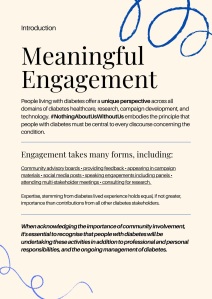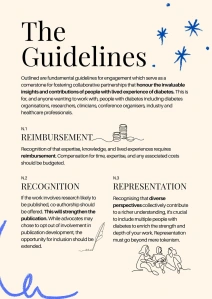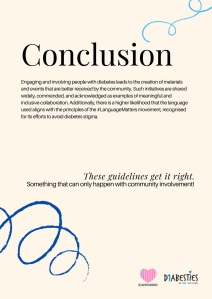The #dedoc° symposium kicked off ATTD 2024 in the most powerful way. Four community advocates from around the world will discuss access to insulin in humanitarian crises, access to diabetes care and technology in low-income settings, access to technology for people living with diabetes, and research findings. Presentations were made on a variety of topics, including access. You can listen to great talks from #dedoc voices Leon Tribe, Tinotenda Dzitiki, NurAkca, and Asra Ahmed here.
The panel discussion included important discussions about how and why it is important to include people with diabetes in every conversation about diabetes. Meaningful consultation is the golden ticket here and there were some valuable comments and suggestions on how that could be done. Someone asked about reimbursement for lived experience expertise. This is an issue that is often ignored when people with diabetes participate in research, programs, committees, and other time-consuming endeavors. Our unique perspective is something no one else can offer, but we have very little budget to cover the cost of our participation. Sadly, offering to pay for your time isn’t routine, and instead you’re often made to feel like you should be grateful for a seat at the table. It’s worth reminding those who don’t value us in an economic sense that we are the table and without us there would be no place for others.
It was clear from the conversations that diabetes advocates have a difficult time demanding compensation for their valuable expertise and time, even when they sit on a podium at an international scientific conference.
I jumped off the stage and lined up the bees jazz seti. We do this at a conference that I have started calling the Jazz and Lentz Special Conference. (You can see my previous efforts here and here.) I planned my next project in less than 5 minutes and I’m so excited to share it with you today. Providing a clear and easy way for people with diabetes and those looking to work with us to understand not only why engagement and consultation are essential, but also why paying our fees is also essential It was clear that some “rules of engagement” were needed. time.
However, it’s not just about repayments. There are also many ways to participate, such as by co-authoring a publication, participating in a presentation program, and having our expertise recognized as important as all other diabetes stakeholders. It also means that our efforts will be recognized.
Here are some simple guidelines that people with diabetes can use when collaborating with organizations, researchers, medical professionals, industry, and others seeking expertise. Use these in discussions with people who invite you to participate in diabetes research. Print these out and bring them with you when you meet with the person running the project or convene an advisory group. You can share them with your network and use the information to as many people as possible to advance the discussion to ensure our value is recognized. I hope this makes these discussions a little easier.
And if you’re interested in working with us, please read on. Still, if we believe that our time is not worth the budget, or that our expertise is not truly worth being valued, then we are making the minimum effort to involve people with diabetes. That’s all I can think of. That is tokenism. We’re not here for that anymore.



disclosure
I was an invited speaker at ATTD 2024, where I presented on the T1D Index as Director of Community Engagement and Communications for the Global Access Team at JDRF International. He also chaired a session on access to research. The registration fee was covered by ATTD. My travel and accommodations were covered by #dedoc°, where I am the Global Head of Advocacy. I chaired the #dedoc° symposium at the conference.


